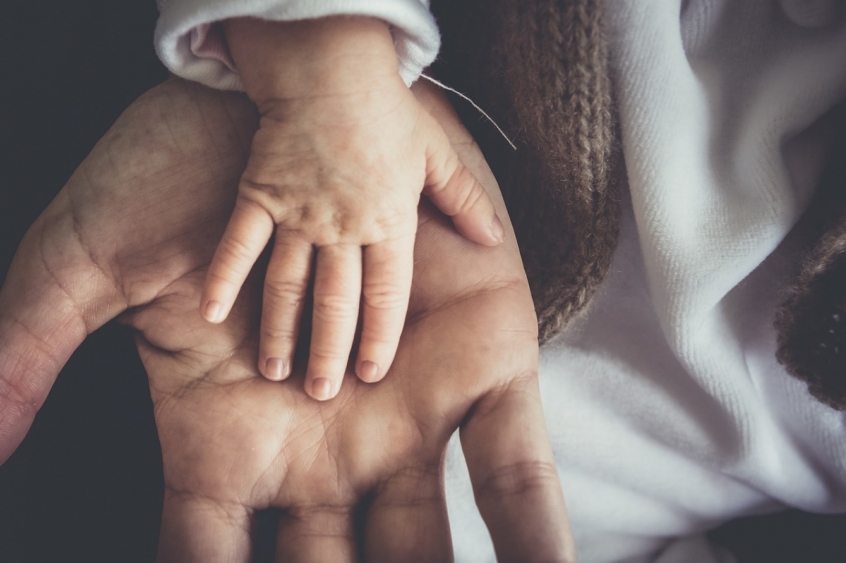
The question I pose in the title is in the news right now because of the almost panicky final act of Theresa May's premiership in extending English law on the subject to Northern Ireland, without (it appears) prior consultation. I wonder why that is, and if it has anything to do with perceived DUP intransigence on the Brexit backstop situation.
15,000 and counting have now signed a petition against the move and there is a general fear that potential disabled children will be targeted.
We already have the horrific scenario of a female judge acting like G-d in mandating the termination of a pregnancy simply because the mother was mentally disabled, even though the medically-trained grandmother had offered to care for the child.
Luckily this ruling was overturned by a higher court and it was then discovered that the original judge isn't exactly impartial about abortion, and is in fact an activist.
My first experience of what abortion is about was when my father, who had been a judge in Poland, told my brother and me of the many times he had come to the assistance of women who had threatened suicide rather than give birth out of wedlock in 1930s Warsaw. The shame for these women was too much to bear in interwar fascist Poland. My father, an expert on Polish law, was willing to disobey Polish law when a woman's life was in danger.
Poland hasn't changed much it seems. A couple of years ago I approached the Polish consul in Manchester to help me translate some of my father's Holocaust-era papers. The young consul, a flashy man with brilliant English, wasn't interested in my Jewish past – he wanted me to become a citizen now, to which I am entitled through parentage on both sides. 'No way', I said. 'But we are Orthodox Catholics, just as you are Orthodox Jews. For instance, just like you, we never ever allow abortion.' 'Absolutely not', I said.
Fifty years ago I had spent time in post-war Germany studying in 1969 at one of its universities. At that time, my experience was one of students espousing lifestyle choices with a ferocity I have never encountered since. Abortion on demand was the rage and used as a form of contraception, together with fluid sexual relationships – all designed to shock the older generation in a morass of amorality – and nobody seemed to care.

And then, earlier this year and 50 years later, I came across the autobiography of one of Israel's greatest Orthodox feminist thinkers, Alice Shalvi (who I had happened to encounter fleetingly on a bus when living in Jerusalem with my family in 1983). At that time we, despite being complete strangers, started up an animated conversation about contemporary Jerusalem and I recalled this chat fondly on recently reading Alice's exciting non-putdownable life story, Never A Native.
Born in 1926, Alice had arrived in England from pre-war Germany, been accepted at Newnham College Cambridge, lived in Clough House (just like I was to do over 25 years later) and then emigrated to Israel. Here she pioneered in the teaching of English, as well as establishing university departments and feminist organisations. But in 1958, she thought she might be pregnant in Jerusalem with her third child, when she caught mumps from her two older children.
The family doctor advised her to abort, because he was convinced that she wouldn't be able to cope with a severely disabled child. Maybe he was wrong to suggest this and, in addition, Alice was law-abidance personified. How could she break the law then in place in Israel, as in much of the rest of the world? In addition, abortion was plain wrong.
She thought: "To abort a child was to take a life. It was immoral. It went against nature. .... Confused, I burst into tears."
And even 60 years later, aged 93, Alice hasn't forgotten what she experienced at the age of 32 when her third child was aborted: "I recall nothing save the excruciating pain as the womb was widened. Nothing I'd experience in normal childbirth prepared me for it. To stop myself from screaming, I squeezed my eyes tight shut and clenched my teeth so firmly that the pain in my jaw distracted me from that in my vagina."
She never told her husband about her abortion.
"In fact, I told nobody. I have never spoken of it. Yet, similarly, I've never forgotten it. Though I gave birth with my customary ease to three additional blessedly healthy, carefully planned children, the thought of that unborn child still plagues me."
The compulsory abortion of female fetuses has been evident in Soviet Russia, India and China. Additionally, in Soviet Russia, abortion was also used, as in post-war Germany, as a form of contraceptive.
Right here in the UK, Lord Steel, the very architect of the 1967 Abortion Act, has spoken of his concerns about the number of abortions taking place and also its being seen as a form of contraception.
And yet, Judaism does not espouse the Polish route of completely outlawing abortion whatever the circumstances.
If I were to describe the core teaching of Judaism (and many competing biblical verses spring to mind), I would cite that the Bible teaches (and Oral Law endorses) that we humans are made "in the image of G-d, in G-d's likeness". The word human includes woman as well as man, but also includes man as well as woman. And various regimes have not managed to get that balance right.
As we are all created in G-d's image, a newborn is sacred, whatever their mental or physical faculties, and the rights of both mother and father to be parents are important.
However, Jewish practice always favours the woman. So if, for instance, there is a choice to be made between the life of the foetus and the life of the prospective mother, the mother's life takes priority. Abortion is therefore allowed in cases of rape, incest, underage sex and if there are certain genetic diseases to which Jews are prone, for example Tay Sachs disease.

Some rabbis also sanction abortion if the mother's mental health is at risk from giving birth. Mental health issues cannot, though, be used as an excuse, but only as a last resort.
In order to avoid as far as is humanly possible the last resort of abortion, rabbis and observant doctors advise prospective Jewish marriage partners to undergo screening for Tay Sachs disease, for instance. And this deadly genetic disease has therefore been almost eradicated in the State of Israel and other areas of Jewish population.
Abortion on demand, which is what the British government endorses and is now extending to Northern Ireland, is regarded as deliberate murder in Judaism, and therefore goes against both the 10 Commandments and the seven Noahide laws relevant to the world at large.
It is difficult to understand how a female Prime Minister who describes herself as a practising Christian can even think of introducing an extension of this destructive law as her final legacy. No religious Jewish political leader would countenance such a move. Rather than furthering the rights of women, extending abortion on demand to Northern Ireland will simply result in more suffering for women who undergo the psychological traumas of abortion, and will also lead to a surfeit in the number of potential female lives and the potential lives of the disabled being cut off at source.
Is this really what Christian teaching is all about, to willfully choose to murder the weakest among us, potential women and disabled people?
I wasn't able to find a local Anglican priest who was able to give me their view on this matter, so I am grateful to former Archbishop of Canterbury, Dr Rowan Williams, for voicing what I suspect is the view of many in the Church who may be afraid to speak out because there is fear nowadays of appearing to be anti-woman – what a shame!
"On abortion: I don't hold an absolutist position on this, in that I believe there are circumstances in which abortion is the least damaging or unfair course of action – though I'd regard it as always the ending of a human life and thus a serious matter," he told me.
"Hence, like you, I'm not in favour of abortion on demand, and am very wary of the 'body as property' idea. I have real concerns about abortion on the grounds of some sorts of disability, let alone gender-selective abortion, and I think the law should protect against these things.
"This would represent pretty much where the Anglican position is officially – i.e. the moral gravity of the question in all cases, the possibility of justified intervention in some, and a concern for those categories who could be made more vulnerable as a result of 'liberalisation' of the law."
The above views come very close to the view taken by the observant Jewish community. Based in biblical teaching, the idea of every single human being made in the image of G-d is developed by rabbinic and observant Jewish medical experts through the ages. All share the view that while the foetus is a potential life, the woman is an actual life, and actual life on balance is more important than potential life.
This is something that has sadly been forgotten by those on the religious right who regard abortion as always a sin and a crime, and by those on the secular left who are in favour of abortion on demand. Neither side does women any favours and maybe it needs more women to stand up and be counted on this matter.
I think that the State of Israel probably has it about right: abortion is a last resort and is always to be regretted, but there are some occasions when it is the lesser of two evils.
This is what much-admired Jerusalem rabbi and thinker Rabbi Dr Nathan Cardozo responded when I asked for his considered opinion on the matter:
"In Jewish Law abortion is not considered murder but forbidden unless the mother is in danger of life (because of the fetus) since the fetus is not yet considered a full human being. When the fetus is badly deformed or carries an illness which is deadly one can abort. Rabbinical authorities disagree till which month of pregnancy one can perform such an abortion."
State-sanctioned abortion as a political stance is never a positive development however and often leads, as it has in contemporary China, to a curtailing of all those other precious freedoms that many of us take for granted – this is the way of totalitarianism – and surely something that people of goodwill should try their hardest to prevent.
Dr Irene Lancaster is a Jewish academic, author and translator who has established university courses on Jewish history, Jewish studies and the Hebrew Bible.
Read more:
The problem with relationships education
What the Jordan Peterson scandal says about Cambridge University













